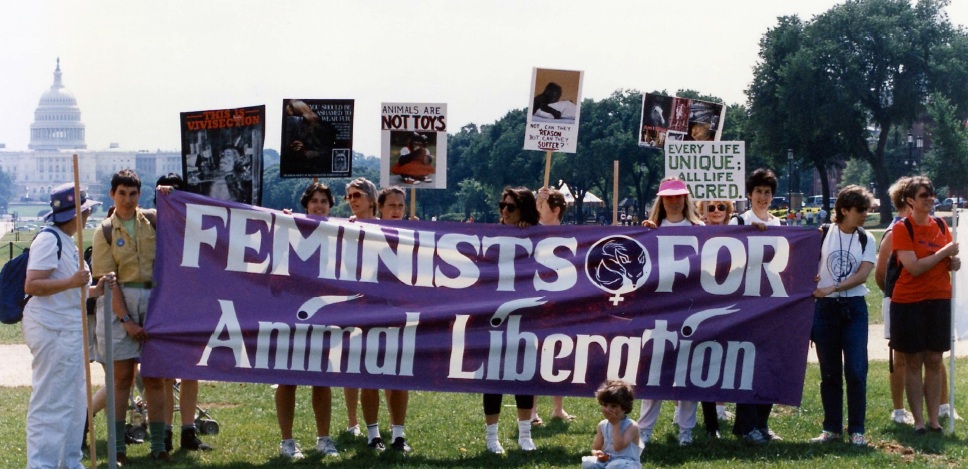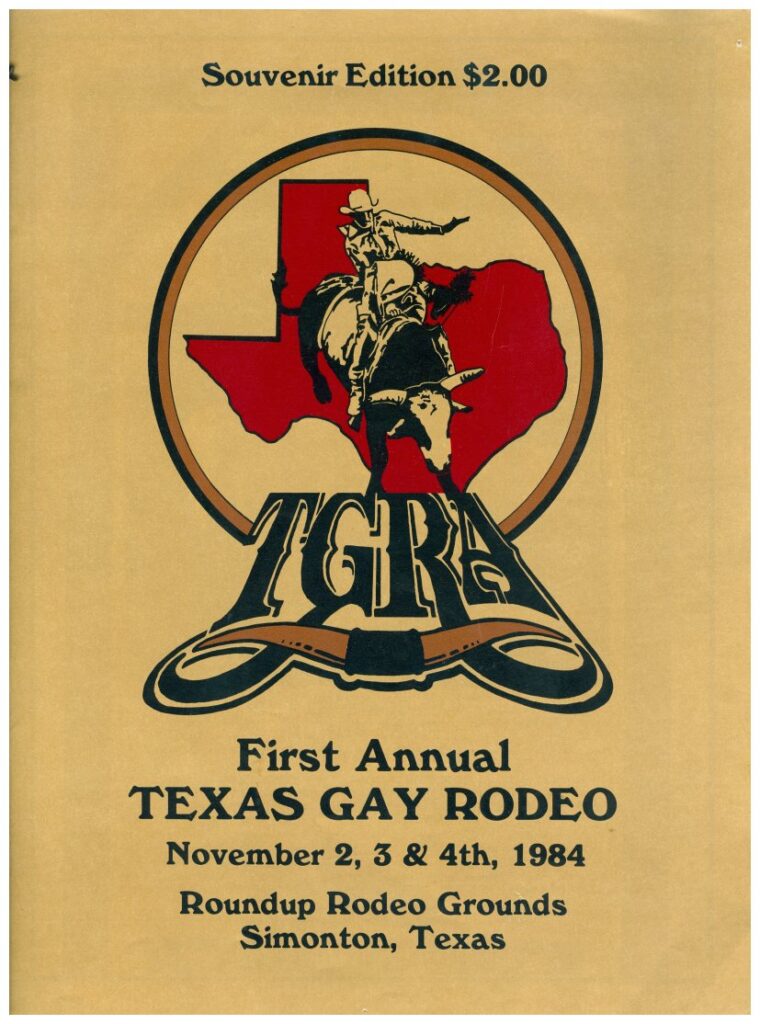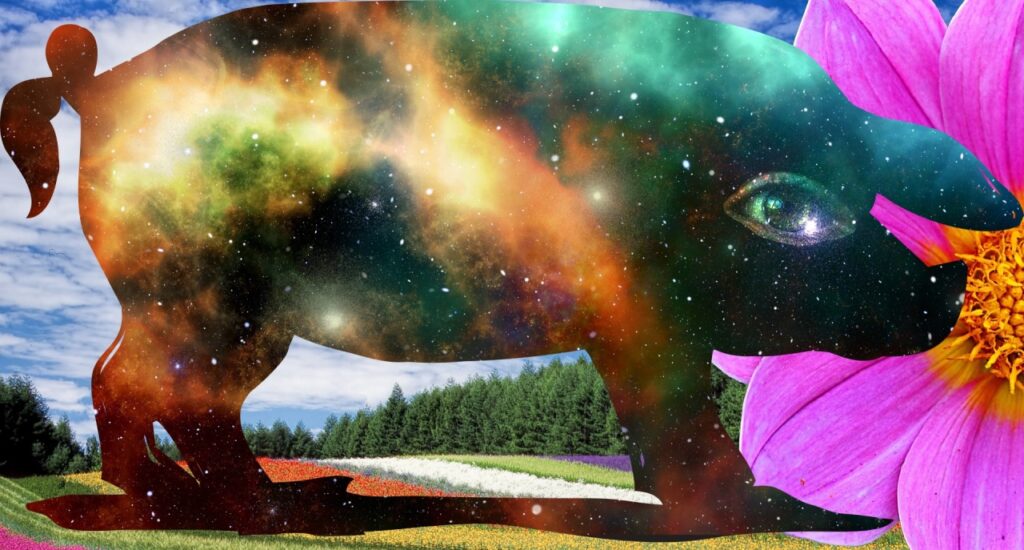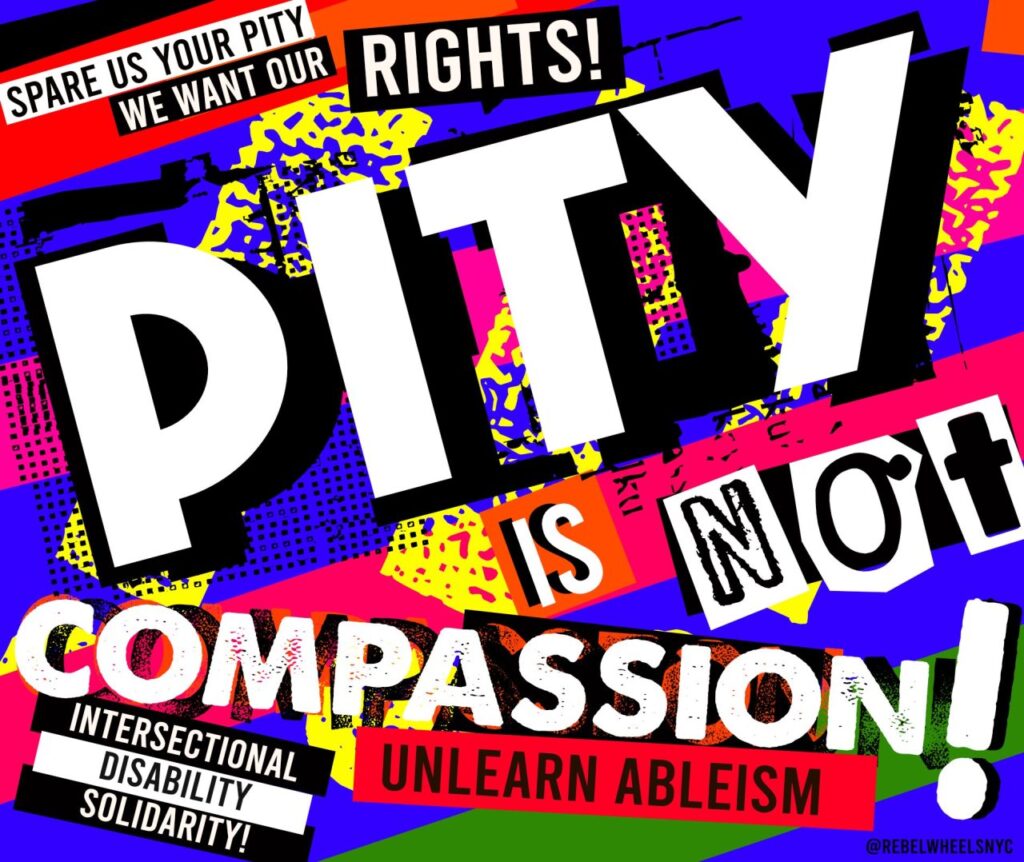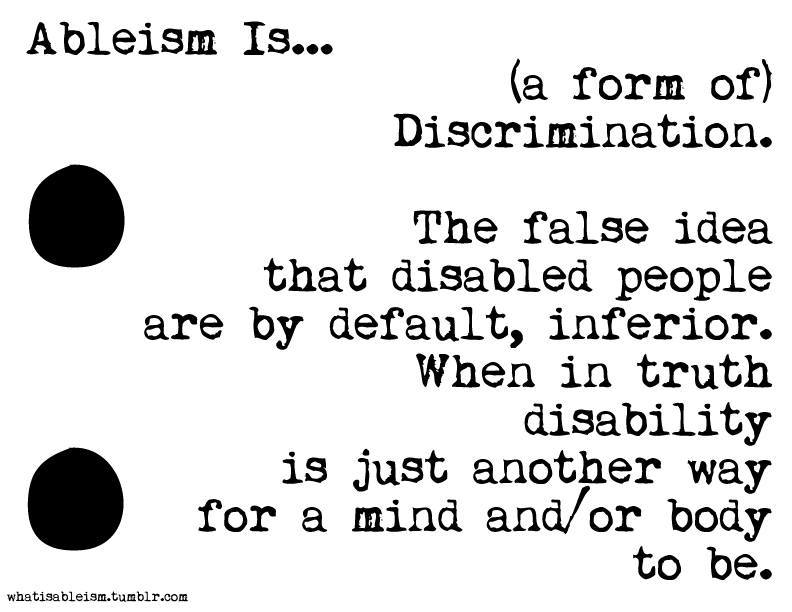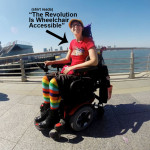
Celebrated around the first of February,1 the pagan holiday of Imbolc2 marks the turning point from deep winter to spring’s edge in the Northern Hemisphere. Imbolc was historically a point of celebration as domesticated animals were nearing the season of birthing. As such, dairy is perhaps the most ubiquitous association with this early spring festival (Greenleaf 2016). This connection is amplified by Imbolc’s alignment with Ireland’s Saint Bridget’s Day, Bridget being the saint of healing, hospitality, and nonhuman breastmilk. Modern ecofeminists, witches, and feminist pagans often frame this breastmilk as symbolic of nurturance, a “mystical gift” (Woodward 2021: 101).
Imbolc is traditionally aligned with exploitation of sheeps, and today, this relationship is romanticized as taking place in a peaceful rural idyll. The reality is anything but romantic, however. All ovine inhabitants of the “idyll” will meet a violent end, and many of them are separated from their mothers and sent on a harrowing journey to slaughter at just a few weeks old given the popularity of “lambchops” and “leg of lamb.” The peaceful scene of the pasture is far from the horror of the finishing floor where many victims are not even stunned before their throats are cut. Nearly three million sheeps slated for Halal or Kosher slaughter in the United Kingdom alone are fully conscious and not stunned before being killed.
The pasture itself is a site of considerable suffering. Mother sheeps are genetically manipulated to produce multiple children to maximize the surplus value to be exploited from their labour, leading to high mortality rates for both mother and children. Pregnancies coerced deep in the winter to meet spring market demands for babies’ flesh, furthermore, leave newborn lambs vulnerable to freezing weather. As a result, almost one in five British lambs do not survive to slaughter. All lambs are subject to “tail docking.” The severing of their tail is accomplished with a knife, hot iron, or a rubber band that causes slow necrosis, and anaesthesia is not offered. To increase their market weight, improve the palatability of their flesh, and reduce their capacity to resist the violence they endure in the trade, male lambs have a similar procedure inflicted on their genitals.
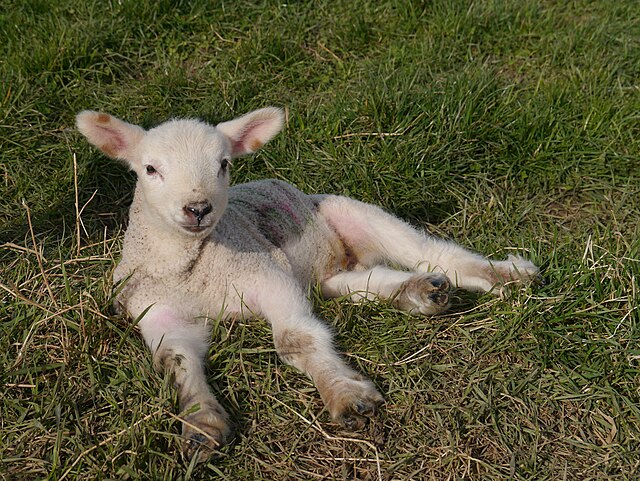
Even in “wool” production, suffering is high; these sheeps also undergo manipulated pregnancies, early removal from their mothers, and unanaesthetised mutilations. The “live export” trade, furthermore, relies heavily on the production of sheeps’ hair. Once “wool” industry victims become burdensome and less productive with age, they are crammed onto transport ships to countries where they can be slaughtered for food and religious purposes. With animals exposed to extreme heat or cold, overcrowding, accumulating filth, poor air circulation, fear, and stress, conditions are so horrific on these multi-level ships that death counts are high. These ships occasionally wreck as well, with animals trapped below deck or flung into open sea where they die by drowning.
With pandemics (most of which have zoonotic origins) now a regularity, sometimes these ships will be denied port, leaving animals to suffer on board for weeks until they die of thirst or heat exhaustion. In these cases, Nonhuman Animals back up in their home countries as well, prompting hasty destruction. After Brexit and COVID-19, for instance, Irish dairy farmers experienced a “calf tsunami” as the domestic dairy industry expanded and international markets shrunk. Many infant boys were shot in the head by farmers a day or two after birth as farmers could not cope with their care as they awaited transportation to offshore slaughterhouses. Male babies are the inevitable “byproduct” from the systematic exploitation of female bodies and always meet with a violent end.
Modern witchcraft ignores these unsavoury realities of “meat,” “dairy” and birds’ eggs production, drawing instead on delusions of peaceful, consenting relationships with other animals. For instance, one Imbolc ritual invites practitioners to “celebrate the day by giving thanks for all the things that sheep have given us” including “fleece for sweaters and milk for cheese” with an “Imbolc prayer.” However, the process of domestication itself troubles the possibility of consent, and domestication by its very nature manipulates the minds and bodies of other animals to facilitate human mastery. Domesticated sheeps are born, live, and die at the whim of human desires.
Vegan feminism sees domestication as an anthroparchal system of oppression that intentionally undercuts the agency of Nonhuman Animals, locks them in bondage through physical and cognitive manipulations and architectural incarceration, and replicates anthropocentric hierarchal arrangements (Mason 1993). Regardless of whether this domestication takes place in backyards, rural pastures, or factory farms, it entails violence and oppression. This is no gift; it is theft.
The modern nature of Nonhuman Animal agriculture has not only rendered insensible the horrors inflicted on Nonhuman Animals, but it has also rationalised speciesist exploitation such that nonhuman bodies and excretions are readily available and artificially affordable for most. The ubiquitousness of animal-based foods has influenced witches’ dietary preferences. This, in turn, has shaped how sabbats are celebrated. Dairy and other forms of animals’ flesh in early agrarian societies would have been scarce, and were, in some cases, intentionally omitted through the rest of the winter months; this practice would be adapted into the Christian practice of Lent. Despite this modern emphasis on abundance and feasting, Imbolc was historically a time of purification, often calling for fasting. Fresh foods were scant and stored foods would be running low. Fasting may have taken on a spiritual, ritualistic quality as a measure to regulate food stores. Practitioners originally forwent any flesh, dairy, or eggs. Later, Lent laws would be relaxed, and fishes and other animals’ products might be allowed.
Today, few practice plant-based winter fasting, as Nonhuman Animal products have become so ubiquitous with intensive genetic manipulation and industrialized agricultural practices. Modern witches seem a bit unclear about this history. The Real Witches’ Kitchen, by way of an example, notes that “fresh food would not have been plentiful at this festival” (80) but nonetheless suggests that “lamb is ideal for this feast” (West 2002: 81). Likewise, The Witches Feast (Brooks 2023) offers a vegetarian stew recipe to celebrate Imbolc in an attempt at historical accuracy, but eagerly advocates roasting an “herby leg of lamb” for March’s spring equinox as this “delicious and impressive looking feast […] makes the most of the meat that would have traditionally been available at this time of year” (57). Imbolc, then, seems to be considered a celebratory time for drinking the breastmilk of pregnant mothers who are preparing to give birth to their babies, while equinox3 entails consuming the babies themselves.
It seems odd that the patriarchal domination inherent to domestication, reproductive manipulation, and blood sacrifice would remain so central to ecofeminist spirituality today. However, while it is true that speciesist traditions remain prevalent in many ecofeminist spiritual paths, being feminist practices, there are no set requirements for ritual observance. This suggests, to some extent, a degree of capriciousness and ample room for retooling for multispecies inclusivity. Bridget was not just associated with the birthing of new lambs and other animals destined for use and slaughter, but midwifery in general. After retreating and resting in the winter months and cleansing body and home, might new rituals for celebrating rebirth and renewal be developed beyond speciesist practice?
The Irish government, for instance, declared St. Bridget’s Day, February 1st, a national holiday in 2018. A corollary to the more equinox-aligned St. Patrick’s Day that follows in March, St. Bridget’s Day honours the major feminist achievements in recent Irish history. But advocates for the holiday emphasize the holiday’s importance in celebrating healing in an era of climate devastation. As the Director of Woman Spirit Ireland explained in an announcement of the new saint’s day: “In a post-Covid world, we will be able to reflect further on her role, asking how the integration of nature, culture and technology can serve to heal our wounds and the vulnerable earth.” Bridget, in other words, has come to embody an ecofeminist worker of magic, and this might easily replace the exploitation of sheeps and cows in a vegan Imbolc.
Notes
- Imbolc is rooted in Western Europe, but has also been practiced as Candlemas with the coming of Christianity. In the United States, it transformed into Groundhog’s Day. All variations celebrate the turning of the seasons, the release of winter, and the increasing daylight hours.
- Imbolc (pronounced “eem-ulk”) is an old Gaelic word that translates to “in the belly.”
- The modern witch community refers to spring equinox as Ostara, a reference to the “livestock” oestrus season.
References
Brooks, L. 2023. The Witches Feast. Salpe Publishing.
Greenleaf, C. 2016. The Book of Kitchen Witchery. London: CICO Books.
Mason, J. 1993. An Unnatural Order. New York: Simon & Schuster.
West, K. 2002. The Real Witches’ Kitchen. London: Thorsons.
Woodward, L. 2021. Kitchen Witchery. Woodbury: Llewellyn Publications.
Dr. Wrenn is Senior Lecturer in Sociology at the University of Kent. She received her Ph.D. in Sociology with Colorado State University in 2016. She was awarded Exemplary Diversity Scholar, 2016 by the University of Michigan’s National Center for Institutional Diversity. She served as council member with the American Sociological Association’s Animals & Society section (2013-2016) and was elected Chair in 2018. She is the co-founder of the International Association of Vegan Sociologists. She serves as Book Review Editor to Society & Animals and is a member of the Research Advisory Council of The Vegan Society. She has contributed to the Human-Animal Studies Images and Cinema blogs for the Animals and Society Institute and has been published in several peer-reviewed academic journals including the Journal of Gender Studies, Environmental Values, Feminist Media Studies, Disability & Society, Food, Culture & Society, and Society & Animals. In July 2013, she founded the Vegan Feminist Network, an academic-activist project engaging intersectional social justice praxis.





